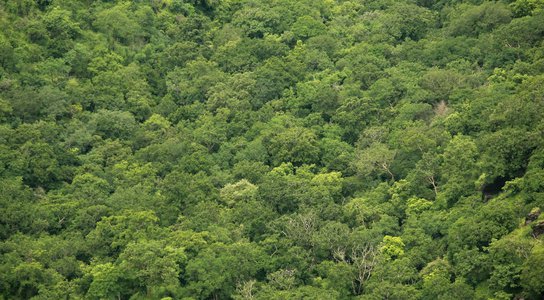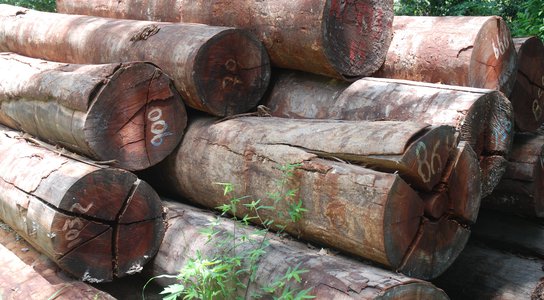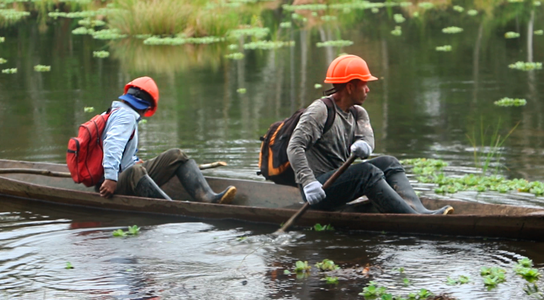First, the good news: the only state agency effectively combatting illegal logging in the climate-critical forests of the Peruvian Amazon – OSINFOR has seen its independence restored, after it was weakened a few months ago. This is an important step in ensuring the problem of illegal logging continues to be tackled effectively.
But it’s only one small step on the road to resolving the many problems that are still pervasive across Peru’s timber supply chain – a small one too in helping protect one of the most important tropical forests on earth from rampant illegal logging. As Global Witness have highlighted for some time, and as a serious UN report this week exposes – if we are to save our planet and life on it, protection of our forests is vital.
There are a whole host of seemingly “unmanageable” problems when it comes to this continued devastation of the Peruvian Amazon – involving a confusing array of state entities.
There’s a conflict of interest problem, for one – regional governments have often been shown to issue corrupt permits to aid timber launderers, while at the same time being tasked with inspecting those same timber harvests and the launderers sawmills.
There are also problems related to the national forest authority SERFOR – which has actively reduced traceability across the timber supply chain, making it harder for its own inspectors to trace timber to a legal origin. SERFOR has also failed to effectively sanction individuals that falsify timber harvest operating plans. This is clear obstruction and negligence from a government institution – whose actual central purpose is to ensure forests are sustainably managed.
There are also major problems with timber companies, and the way they persistently source and sell large volumes of illegal timber with almost zero consequence.
And, importantly, there is a problem with regional governments and SERFOR failing to provide essential information to OSINFOR – strangling its ability to be an effective watchdog.
All of these issues might seem hard to resolve, requiring reform across many state entities with overlapping functions.
However, as our tropical forests become ever more critical in the fight against climate breakdown, fighting these problems is crucial. And if we break these challenges down into their essential elements and focus on what could be easily achievable, some light emerges through the proverbial forest canopy.
Giving OSINFOR more power
The first step for the Peruvian Government might be to respond to OSINFOR’s repeated requests to expand its mandate, so it can better tackle timber laundering, helping it achieve one of its crucial aims of conserving Peru’s vital Amazon forest. This would include:
- Giving OSINFOR the power to inspect and sanction timber harvest areas currently beyond its mandate. Some of these areas are emerging as new timber laundering vehicles. Laundering happens when paperwork from an authorized area is used to extract timber elsewhere, in an unauthorized area. It is a massive problem in Peruvian forests.
- The areas OSINFOR should be able to inspect to curb this problem include areas where regional governments have authorised clear cutting of forests to make way for agriculture, as well as plantations on private or communal lands, and other areas where timber is extracted as a result of infrastructure, mining, oil and gas operations.
- Expand OSINFOR’s mandate to include the ability to inspect sawmills, which are true black holes in the supply chain and, as a result, actively drive illegal logging through their constant, unchecked demand for illegal timber.
- Grant OSINFOR the ability to cancel harvest areas that are being used as laundering vehicles and which OSINFOR currently does not have the power to cancel, in particular so-called “bosques locales” – timber harvest areas created under the previous forest legal framework, some of which are still in place.
But for OSINFOR to further improve its work, it needs the help of others too.
Regional government support
For many years, regional governments have been extremely slow or failed entirely to inform OSINFOR when they establish timber harvest areas or approve operating plans in them.
The law requires regional governments to inform OSINFOR within 15 working days. But according to OSINFOR’s own statistics, in 2018 they failed to do so an astonishing 86% of the time.
What this means in practice is that, by the time OSINFOR has found out about the approval of an operating plan and then goes to inspect it, the illegal logging has already happened and the damage is done.
The Peruvian Government could start to solve this problem by providing additional regional support – perhaps in the form of SERFOR regional officers – in the key logging regions of Loreto and Ucayali – both of which account for almost 70% of round wood production in Peru.
These are the regions where regional governments yearly approve the highest amounts of timber harvesting operating plans. SERFOR has offices in both, and through them they are supposed to support regional governments. Deploying an existing SERFOR regional officer to a regional government office could be crucial in providing this support. They could monitor the approval of operating plans by the regional governments, and help send these to the OSINFOR offices in those regions immediately after approval.
Regional governments with staff that are susceptible to corruption might then also find it that much harder to approve falsified operating plans, or permit laundering of timber through them, knowing there is someone scrutinising their activities, while honest staff might have much-needed support.
This could also be done relatively easily, by re-allocating existing SERFOR resources to ensure this seemingly mundane but in fact vital task is effectively carried out. This is by no means a prescriptive recommendation, but rather an example of a specific measure that might help improve the situation without the need for additional resources.
Moving forward
There are many other reforms needed to improve the regional government’s relationship to the logging industry. The same goes for SERFORs relationship with the industry.
But all these important problems will take time to resolve.
In the interim, solutions focused on improving OSINFORs efficiency, as the ones suggested above, could be easily implemented by using existing resources more efficiently, helping Peru protect its globally important forests and sending a strong signal to the world that the government is serious about tackling a persistent and pervasive problem.


